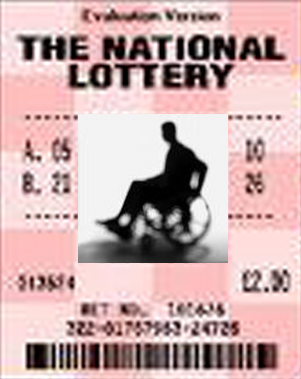
This started when I read an online solicitation from a personal injury (PI) lawyer. He wrote that injured patients should use his firm because they get the highest awards. Is that the sole measure of success in medical malpractice cases? Does your injury during health care become your lottery ticket?
•I'm going to get even with that doctor who hurt me.
•SOMEONE should pay me for my woes.
•My PI lawyer is the greatest: he got me a million dollars!
These sentiments are understandable. We are all human. Humans need closure and a sense of equity or balance. Humans behave like homo economicus [Behavioral Economics] and seek to maximize our personal utility [Utilitarianism]. Translation: we want to get as much as we can for ourselves. In our society and with our tort system, that means fighting for dollars.
When someone is injured during health care, people see an opportunity to cash in: The Lottery Philosophy. The more disfiguring the injury; the younger the patient; or the deeper the pocket, the greater chance exists for a big award. Such cases appeal strongly to the jury's sympathy.
Most patients and all PI lawyers measure success not on any principle of equity or improvement but solely - like their business confreres - by the size of the award.
If you think everything written above is just fine and appropriate, then stop reading. If you can get beyond the vengeance impulse and the expectation of winning the Lottery, read on.
Human-ness
If you accept that we are all human and that humans are by nature imperfect, what about nurses and doctors? Are they allowed to be human? No, society demands that they produce perfect results every single time time. As Chassin wrote over ten years ago, "We have created systems that depend upon idealized standards of performance that require individual physicians, nurses, and pharmacists to perform tasks at levels of perfection that cannot be achieved by human beings."
The system has zero tolerance for providers' human-ness. A mistake - even if it is one wrong decision out of a million right ones - must be punished. Ordinary people are allowed to be human: health care providers are not. People are not held responsible for their personal health decisions but health care providers ARE (held responsible for patients' decisions).
Causes of Medical Injuries
Please do not immediately dismiss what I write because you think I may be a doctor protecting his own. Every assertion is backed by hard evidence.
FACT: The most common cause of injuries during health care is ignorance, not of the provider but of MEDICINE. Medicine cannot predict individual outcomes; people respond differently to the exact same treatment regimen; and for many medical conditions, there are no good answers.
FACT: Medical mistakes are common. Most cause no harm.
FACT: If there is a bad medical outcome, it is assumed that the reason is a mistake. Since the doctor is the Captain of the Ship, she is responsible and therefore, she caused the injury. Most providers are automatically guilty until proven innocent, and since healthcare only rarely establishes a clear cause-effect connection, the provider can never be proven innocent.
FACT: The vast majority of patients injured during health care receive whatever additional medical care they need but no compensation.
FACT: The medical malpractice system was never intended to weed out the truly incompetent. It is very inefficient at "quality assurance." Even worse, medical malpractice discourages learning and thereby prevents improvement.
Success in Medical Malpractice
What we seem to want in medical malpractice is an-eye-for-an-eye and winning the Lottery. What SHOULD we want?
Success should not be measured by who gets the most money. Success should not be dependent on winning an adversarial (tort system) contest.
Success in medical malpractice should be what the public needs: 1) help and compensation for all who are injured during health care; 2) a system - not dependent on imperfect humans - that protects patients from preventable adverse impacts; and 3) better outcomes tomorrow than are possible today. THAT is what we should make the system deliver to us and that is exactly what the current medical malpractice system cannot do.
The Lottery Philosophy has no place in healthcare. We cannot change people's desire to win big. We can change the system so it will get us the outcomes we need and should want.